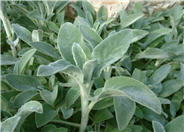
Common name:Lamb's Ear
Botanical name:Stachys byzantina
This tiny shrub will grow less than 1' tall and has medium-size, greyish-green leaves with blue and lavender flowers that bloom in the spring. This shrub is grown more for its velvety leaves than the flowers. It is drought tolerant once it's established. Be careful not to overwater.
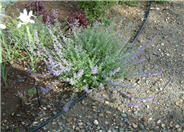
Common name:Catmint
Botanical name:Nepeta X faassenii
Nepeta faassenii makes soft, grey-green, undulating mounds to 1' tall in bloom, spreading 3'-4' wide. The small leaves are attractive to cats. This perennial has lavender blue flowers in summer. Catmint can be planted in sun or shade and needs medium amount of water. Prune spent flowers to encourage more blooms.
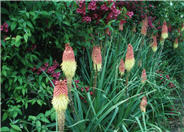
Common name:Red-Hot Poker, Torch Lily
Botanical name:Kniphofia hybrids
This perennial will grow to about 6' tall and has large green leaves and has red, orange, and yellow flowers that bloom in spring, summer, and fall.
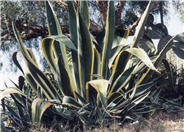
Common name:Variegated Century Plant
Botanical name:Agave americana 'Variegata'
'Variegata' has gray green leaves with a creamy yellow margin with serrated edges. This agave will grow 6-10' tall and up to 13' wide. It has a very open growth habit, with leaves that curve along their length. Tip of the leaves have a poisonous sharp spine. After 10 years or more, this Agave may send up yellow blooms, 20' tall, attracting bees and birds. Plant dies after flowering but pups may be removed to start plants.

Common name:Catmint
Botanical name:Nepeta X faassenii
Nepeta faassenii makes soft, grey-green, undulating mounds to 1' tall in bloom, spreading 3'-4' wide. The small leaves are attractive to cats. This perennial has lavender blue flowers in summer. Catmint can be planted in sun or shade and needs medium amount of water. Prune spent flowers to encourage more blooms.
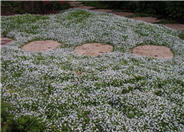
Common name:Blue Star Creeper
Botanical name:Pratia pedunculata
Pratia pedunculata has bright green, nearly stemless, 1/4" leaves. In late spring and summer, tiny, star-shaped pale blue flowers appear on the tightly woven green "mat" of foliage. It prefers rich, well draining soil in full to part shade.
| Designer: Mark Lewis | Flagstone Entrance |
Photographer: GardenSoft |
Soils and Compost:
Maintain a two to four inch layer of mulch on the soil surface to reduce weeds, infiltrate rain water, and reduce compaction.
Water Saving Tip:
Change spray sprinklers to low-flow bubbler or drip systems. Shrubs and trees are ideal candidates for this type of irrigation because the water is applied directly to the root zones.
Integrated Pest Management:
Develop healthy soil for plants that are vigorous and naturally pest-resistant.
